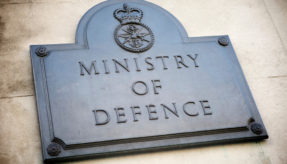
The Ministry of Defence recently released its Digital and Information Technologies Strategy, which sets out its plan to effectively exploit information and systems vital to defence. We take a look at the strategy’s scope and implementation.
The role of the Digital and Information Technologies (D&IT) function is to harness the potential of new technology and, in close partnership with colleagues across defence, to deliver capabilities and new ways of working that match the increasing speed at which the world is moving.
With an estimated £37 billion to be spent over the next ten years, the opportunities provided by emerging digital technologies will continue to drive up demand. Making the most of these opportunities will require new levels of teamwork across the function and the whole of defence. It also drives the need for clear strategic intent, prioritisation and efficient use of resources.
The Ministry of Defence’s D&IT strategy outlines how the function will exploit the benefits of emerging digital capability, how it will undertake that journey and how the function will work across defence to achieve these ambitions.
The MOD has taken some big steps in recent years in successfully updating its outdated IT systems and introducing the industry–standard Office 365 suite. It now plans to continue these efforts to enable users to exploit new ICT services and tools as they are introduced.
The strategy is based on three critical principles – to provide cohesion through consistent architecture, standards and management processes; integration by means of digital services and products that connect, integrate and share data by default; and speed and adaptability by meeting user needs quickly, improving services wherever possible.
It is envisaged these principles will generate significant improvements in a number of key strategic areas. These include digitising the battlespace; responsive cyber defence; promoting information-led wider business transformation; and improvements in efficiency and cohesion.
Responsible for ensuring the strategy’s implementation is Charles Forte, Chief Information Officer (CIO) for the MOD. As Function Owner he will direct future D&IT design, investment and operation across the Department.
He explained: “Defence has an ambition to put modern digital capability at the heart of how it operates to create winning advantage. This is driven by an underpinning premise that emerging digital technologies together with the effective capture, analysis and use of information will enable transformative military and business performance.”
The strategy explains that the need to keep pace with adversaries who are rapidly expanding their information capabilities is critical; and that if the UK is to sustain a competitive response, it will have to accelerate its ability to access and deploy game-changing technologies.
It highlights four challenges to be overcome to meet this requirement:
- There is a clear requirement for data to be easy to access, exploit and defend through the implementation of a common technical architecture and IT operation standards.
- Expectations should be met in terms of providing a defence-wide IT operating environment supporting simple, standardised processes to service defence needs, at a satisfactory speed.
- As with most government departments, there is an expectation that expenditure will be minimised where possible.
- There is also a need to work as an aligned function to a common strategy, allowing users to experience the speed and agility of service that they need and to benefit from the latest cutting–edge technologies.
While measures are already being taken to address these challenges, the MOD recognises there is a need for a step change and views the strategy as an essential step in meeting these challenges.
Mr Forte continued: “This strategy outlines our approach to ensure that we can realise this ambition and fully exploit the opportunities afforded by the transformative nature of emerging digital capability.
“To do this requires a bold mindset that challenges the way we operate and recognises that success requires fundamental change and will not be achieved by just doing the same things better. Meeting the needs of defence in the future hyper-connected digital society will require a cohesive and joined-up function; the efficiencies and effectiveness we seek lie in building digital and information capability that integrates across existing internal and external boundaries in defence.
“By creating new levels of teamwork, we can create value-based outcomes that achieve better performance and competitive advantage over our adversaries for each individual part of defence.”
The strategy will be followed by the D&IT function plan, which will set out in more detail the KPIs and measures of success for meeting these objectives.
Not all these will be directly measurable, as the effect of this strategy will reach across every part of the Department in the capability, effectiveness and efficiency of UK military and business operations as measured in the outcomes of the TLBs.
Mr Forte added: “This is truly an exciting time to be part of the D&IT function inside MOD. Breathtaking technology is being developed at an unprecedented pace. Defence’s strategic intent to exploit it means the D&IT function plays a critical role in enabling its adoption and use.
“I am proud to be part of it, and I look forward to helping grow the already impressive contribution D&IT has made to UK defence and to working with colleagues inside the function and across defence to achieve our vision.”
If you would like to join our community and read more articles like this then please click here.







